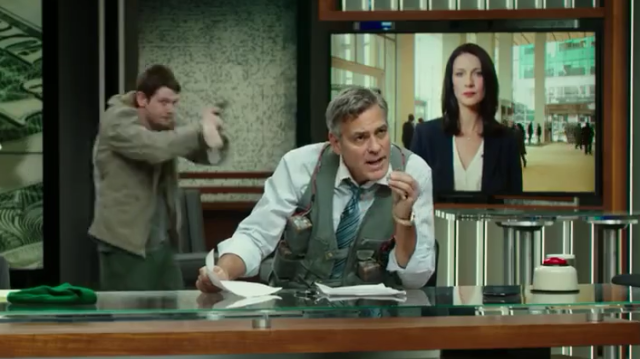
News -
Five lessons the new George Clooney movie Money Monster teaches us about crisis communications
There's a particularly tense scene in the new George Clooney movie "Money Monster", which should be of great interest to media spokespeople who are confronted with a crisis situation.
Clooney, playing fictional financial TV host Lee Gates (here's lookin' at you, Jim Cramer) is threatened live on air by a gunman, who lost his life savings investing in troubled Ibis Clear Capital after it announced a big loss. Gates had recommended the algotrading company's stock on his show.
Gates' down-the-line guest, Ibis' Chief Communications Officer Diane Lester (Caitriona Balfe), delivers rehearsed holding statements to the camera in a live cross.
The gunman doesn't buy it, putting Gates' life perilously in danger.
Gates' producer Patty Fenn (Julia Roberts), commenting in Gates' earpiece from the TV control room, doesn't buy it either.
The dialogue goes something like this (spoiler alert!):
Gates (to camera): We're going to talk to Diane Lester, she's the PR lady…
Fenn (in his earpiece): She's the CCO.
Gates: …the Chief Communications Officer at Ibis. Diane?
Lester (to camera): First, let me start off by saying on behalf of everyone here at Ibis, we are prepared to do whatever we can to get you to put down that gun, Mr Budwell. Now, I understand that you have offered to compensate him for his losses personally, Lee? Well, we are absolutely willing to do the same if it helps to put an end to all this.
Budwell (waving his gun): No, it's too late for your money, lady. All I want from you is an answer. I just want to know what really happened.
Lester: The truth is, we don't know. We don't know why the algo suddenly went haywire. We don't know why the failsafes built to prevent…
Fenn: God I really hope she has more to say than "we don't know".
Lester: …the way they were supposed to. We just don't know.
Fenn: Are you kidding? This is all she's got? Are you kidding me?!
Lester: We owe you complete transparency, and this is it. I would like to point out that this affected all of us. All our board, our managers, including myself, our pensions were depleted overnight and our savings gutted, just like yours.
Budwell: Wait, I'm sorry. Are you trying to get me to feel sorry for you? Is that really what's happening right now?
Lester: No…
Fenn: That's exactly what's happening.
Lester: …I'm trying to give you some specifics.
Fenn: Well, why doesn't she give him some specifics?!
Lester: This was a completely isolated incident. It's what we call a 'black swan'. It's impossible to predict, but it's impossible to replicate.
Budwell: A black swan?
Fenn: That's her memo. She's reading from her memo.
Gates: Diane! Diane! We've both read your talking points. He doesn't want some PR spin about what's going to go right next year. He wants an explanation about what went wrong last week.
Things never got this exciting when I was at CNBC. And obviously this is a work of fiction. But unless you want your media appearance to come up under the YouTube search terms "interview fail" or "worst interview ever", you would be well-advised to draw some lessons from this situation.
- Front up. In the movie, Diane Lester's colleague urges her to keep a low profile until the CEO reappears. To her credit, Lester goes ahead with a live cross anyway. You should, too. This is the 21st century. Running away from the cameras is not an option.
- Have something to say. Real audiences are more skeptical of corporate messaging than ever before. They won't buy "we don't know" anymore. Just ask the relatives of passengers on MH370. That's not to say you should mouth off about whatever comes to mind (again, just ask the relatives of passengers on MH370). But don't insult your audience's intelligence. Discard whatever you might have said in crisis situations ten years ago. We're in a new era now. YouTube show hosts with millions of subscribers are going to dissect your words, and there's nothing you can do about it.
- Keep your audience front and centre. Telling your customers you have suffered, too, is of no comfort when you represent corporate interests. It's all about the customer.
- Get answers. Don't just say transparency. Show transparency. In the movie, Diane Lester ends up going to extraordinary lengths to find out what happened at her company. You should, too.
- Colluding with journalists only takes you so far. Watch the movie, and you'll see how Gates and Fenn begrudgingly accept the corporate holding statements before the gunman walks into the studio, but when their lives are on the line their allegiances change. No matter how long you have fostered good relations with journalists and producers, and no matter how big an advertiser you are, if the story is big enough, the media will choose the story over their relationship with you.
Add your comment below: Have you seen the movie? How do you think Lester handled the situation? What would you have done differently?
